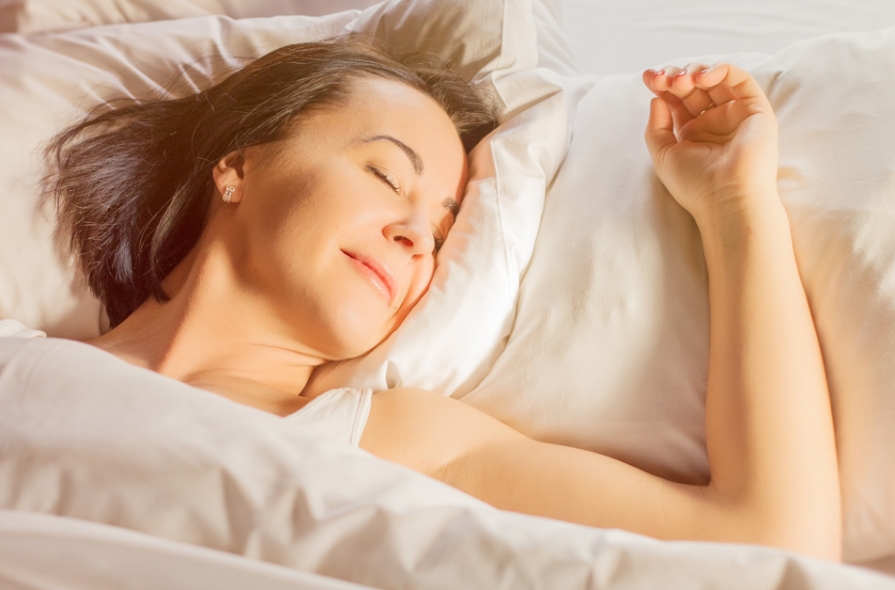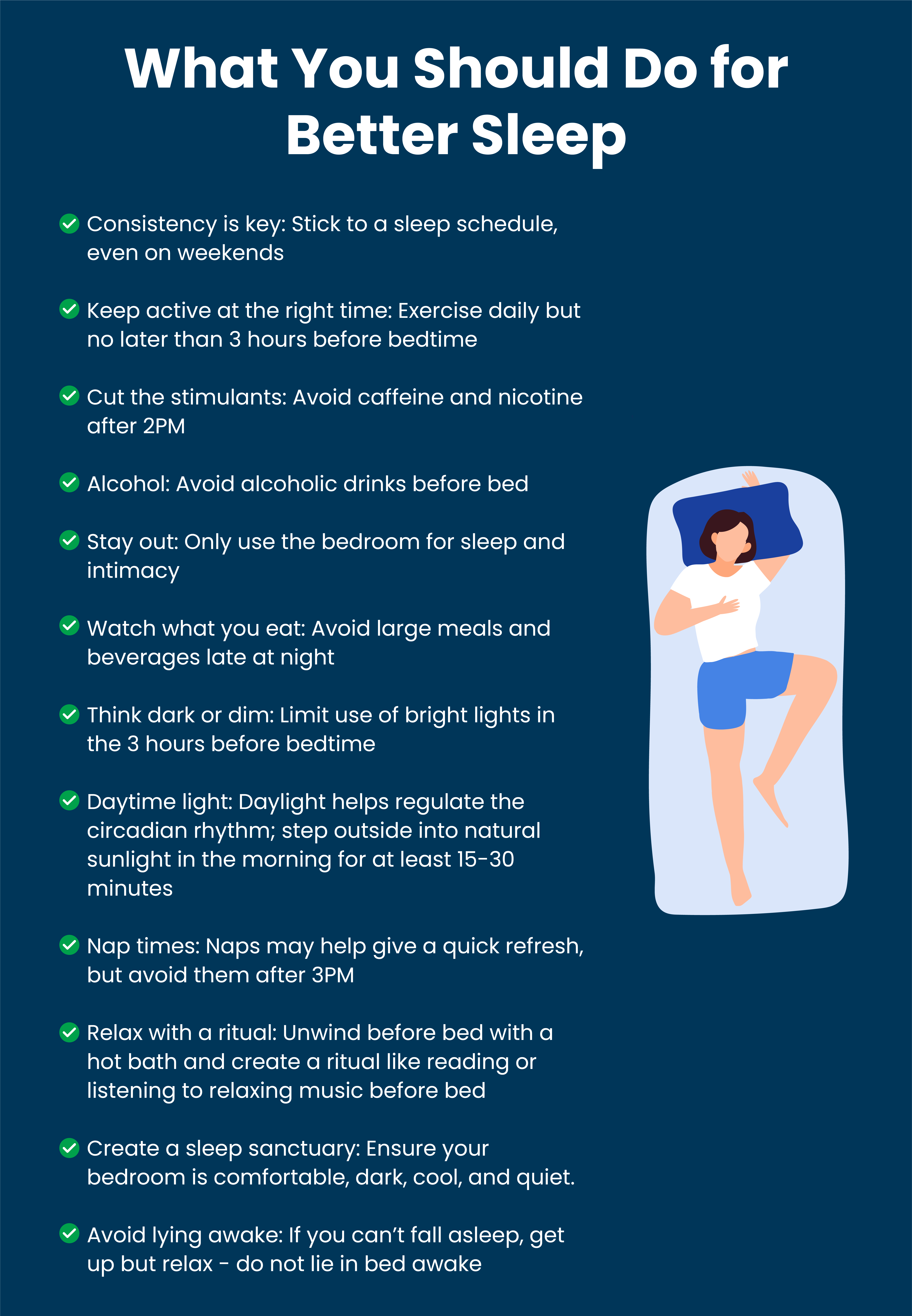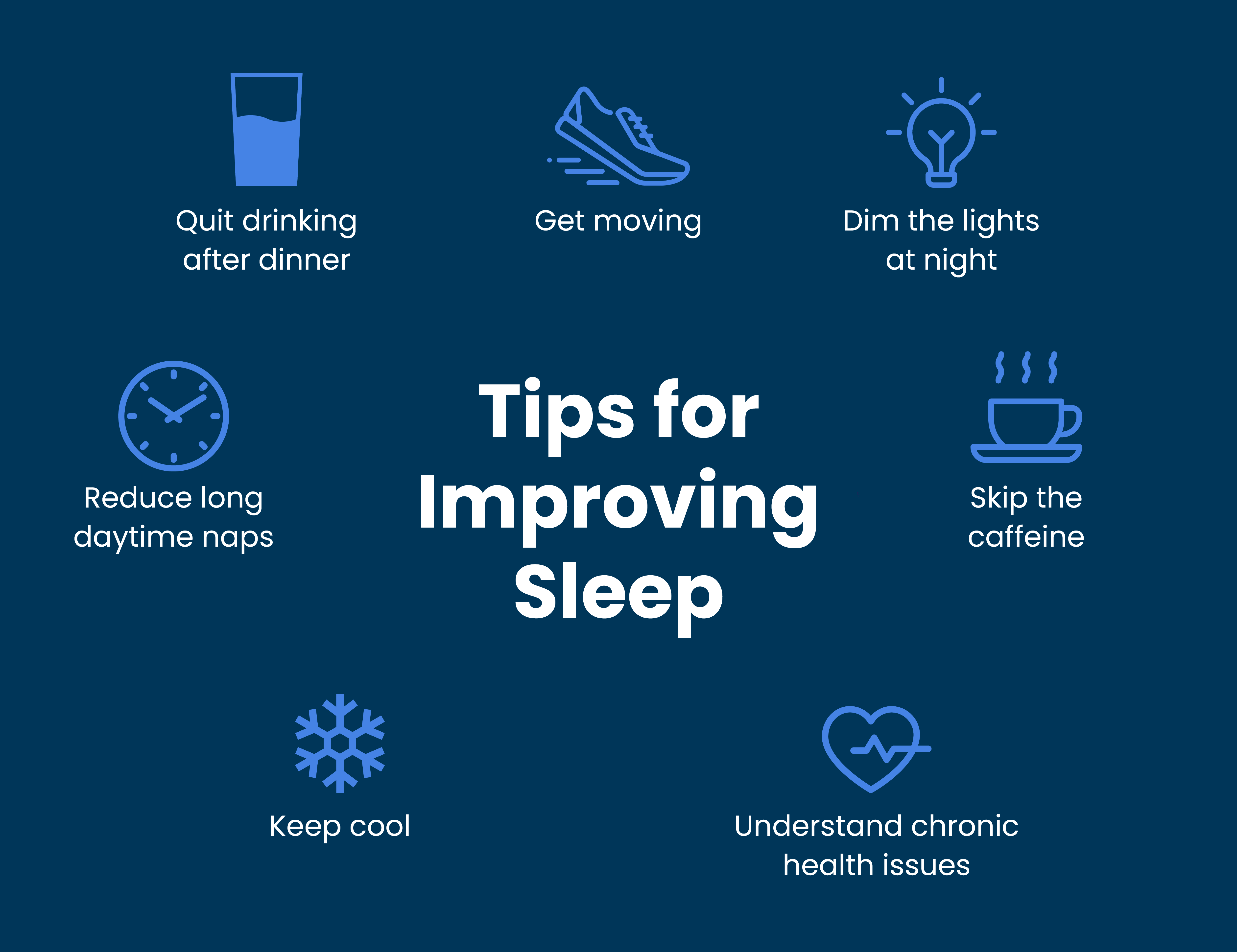7 Tips to Sleep Better Tonight

7 Tips on How to Sleep Better
How many times have you made decisions that negatively affected your sleep? Anything from a late afternoon coffee to a nightcap before bed can be great in the moment, but terrible for sleep.
By missing out on sleep, you are depriving your mind and body of the necessary building blocks to perform at the highest level each day, both mentally and physically. Sleep helps you rebuild tissue, repair damaged cells, and build up energy for the next day. With that being said, it’s imperative that you find a way to snooze better.
If you’re wondering how to get a good night’s sleep, you’re not alone. Many people struggle to get enough high-quality sleep each night, sparking the growth of an entire industry built around sleep aids and technology. The good news is that it’s relatively easy to take steps to help ease your sleep woes so you can get the rest you need every night. Read on to learn our seven tips for better sleep.
Why is a Good Night’s Sleep Important?
A good night’s sleep can help you feel refreshed, sharp, and ready to take on the day. While you sleep, your brain and body perform essential restorative processes that enable you to feel your best when you’re awake. Below, we’ll go into more specific detail about the benefits you can get as a result of better sleep, as well as the consequences that come with not getting enough sleep.

The Benefits of Better Sleep
When you get the sleep you need, you’re able to reap a number of valuable benefits. A good night’s sleep doesn’t just benefit your physical health, but also your mental health. While the lights may be out on a conscious level, plenty of important processes are taking place behind the scenes as you snooze the night away.
First of all, sleep is essential when it comes to your mental health. Developing healthy sleeping habits, such as creating a consistent sleeping schedule and getting sunlight exposure throughout the day can help improve not only your sleep but your mental health as well. With enough sleep, you’ll have more mental energy and you’ll be empowered to effectively process situations and make thoughtful decisions.
Of course, sleep is also important as far as your physical health is concerned. According to the CDC, getting a sufficient amount of quality sleep can help you maintain a healthy weight, lower your risk of diabetes and high blood pressure, and help your body repair itself. So, if you play sports, exercise, or generally live an active lifestyle, sleep can help refuel your body and allow you to perform at the highest level.
The Consequences of Lost Sleep
Getting enough sleep isn’t just important because of the benefits it affords your mind and body. Sleep is also important because of the consequences you face if you don’t get enough of it. Without high-quality sleep, your mental and physical health can begin to deteriorate, which ultimately takes a toll on your well-being and quality of life.
In the short term, studies find that lack of sleep can negatively impact your judgment, mood, and productivity. It may be harder to learn and retain information and, at the same time, you may feel more stressed out and emotionally volatile. In the long term, poor sleep can lead to serious health problems, such as obesity, heart disease, diabetes, and premature death.
Additionally, not getting enough sleep doesn’t just affect yourself—it can also put others in danger. If you work in a job where you’re responsible for the safety of others or you operate heavy machinery, insufficient sleep can increase the chances you’ll exercise poor judgment or make a mistake. There are also plenty of documented cases of drivers feeling drowsy or falling asleep at the wheel due to poor sleep.
7 Tips for Better Sleep
It can be hard to rewire your sleep schedule so that you get a good night’s sleep. You may be used to staying up late at night and waking up early in the morning. Perhaps you simply struggle to make yourself fall asleep when it’s finally quiet and dark. If you’re wondering how to sleep better, you’re in the right place. Here are our seven tips for better sleep.

1. Reduce Long Daytime Naps
If it’s a particularly slow day and you don’t have much to do, it may seem nice to take a long nap in the middle of the afternoon. However, you should think twice before taking a long daytime nap.
While a long daytime nap may feel good at the moment, it will also make you feel more awake at the end of the day when you’re preparing to go to bed. This can make it so that you toss and turn in bed for hours at night until you fall asleep, thereby throwing your entire sleep schedule out of whack.
2. Skip the Caffeine
Caffeine is a stimulant that helps you stay awake and alert. Although a cup of coffee or an energy drink may be a short-term solution to your tiredness, caffeine can also prevent you from falling asleep or getting a good night’s rest.
Managing caffeine and sleep can be challenging, as caffeine can reduce the number of hours you sleep at night and disrupt your sleep architecture by limiting the amount of time you spend in deep sleep. Sleep is essential for your overall health, which is why it’s important to understand caffeine’s effect on sleep.
To avoid sleep disruption, restrict your caffeine consumption to the morning hours. If you do have an afternoon coffee, it’s typically best to stick to a 2:00 p.m. cut-off.
3. Quit Drinking After Dinner
Although alcohol can make you sleepy, alcohol is a potent inhibitor of important sleep stages such as rapid-eye-movement sleep (REM) and deep sleep.Indeed, drinking alcohol within four to six hours before bedtime can keep you from reaching important stages of sleep.
Additionally, alcohol dehydrates you, which can lead to your waking up thirsty in the middle of the night. This disruption can interfere with the most impactful stages of your sleep cycle. Plus, waking up one or more times throughout the night can shorten the amount of time you’re asleep and impede the quality of your sleep.
4. Get Moving
Your body was made to move around and be active. Thus, getting consistent, moderate exercise during the day may help you fall asleep more quickly and get you into a deeper sleep for a longer period. With that being said, exercising too close to bedtime might make you feel wide awake. Vigorous exercise keeps your body temperature elevated, which can make it harder to fall asleep.
In order to improve your sleep through exercise, you might consider scheduling workouts first thing in the morning. A morning workout will allow you to get the exercise you need without interfering with your sleep. Additionally, getting active in the morning can be a great way to energize yourself for the day ahead.
5. Dim the Lights at Night
Light has the biggest impact on our circadian rhythm—far more so than food or social cues. Do yourself a favor and step away from screens in the evening, whether this means your TV, phone, or computer. If you truly must work after dinner, use a filter on your computer or laptop screen to block out blue light, as this wavelength of light can keep you awake longer than yellow light.
Try to limit your exposure to artificial light by limiting the use of bright screens 2-3 hours before bedtime. Once you are ready for bed, use an eye mask for sleep or blackout shades at night to block out unwanted light and keep potential midnight wake-ups at bay. With accessories like eye masks and blue light blocking glasses, you can keep light from being a negative stimulus that ruins your sleep.
6. Keep Cool
Body temperature and room temperature both help us fall asleep, stay asleep, and get more restorative sleep. During the day, your body temperature fluctuates depending on your circadian rhythm, the temperature of your surroundings, your diet, the activities you take part in, and so on. In the evening, your body temperature starts to decrease, reaching its lowest temperature sometime in the early morning.
If your bedroom is too warm, it may interfere with your body’s need to cool down and cause you to wake up several times throughout the night. Although everyone may have a different optimal temperature for sleep, 65 to 72 degrees is generally considered to be the sweet spot. A great way to keep cool (or warm) while remaining comfortable at night is with a breathable, weighted blanket.
7. Address Chronic Health Issues
Of course, physical ailments can get in the way of day-to-day life—chronic health issues can directly impact the physical activities you take part in, the diet you follow, and the interactions you have throughout the course of the day. However, did you know chronic health issues can also negatively affect the quality of your sleep?
Neurological diseases, sleep disorders, and medications for chronic illnesses can all potentially contribute to sleep problems. Conversely, insufficient sleep can lead to an array of chronic health problems, including obesity, depression, and anxiety.
If chronic health problems are interfering with your sleep, you should consult with a doctor or sleep specialist. They can give you guidance on how to get better sleep, whether that means switching out your medication or making adjustments to your nighttime routine.
Additional Tips for Better Sleep
In addition to these seven tips for better sleep, there are a few changes you can make to improve your sleep for the better. If the tips above haven’t helped you improve your sleep, try implementing one of these practices:
- Improve sleep hygiene: When it comes to improving sleep, it’s important to be consistent. This means sticking to a sleep schedule, even on the weekend.
- Stay out: Only use the bedroom for sleep and intimacy. Using your bedroom for other activities, such as working or watching TV, can make it hard for your brain to associate your bedroom with a sleeping environment.
- Get daytime light: Daylight helps regulate the circadian rhythm. To improve your sleep, step outside into natural sunlight in the morning for at least 15-30 minutes to improve your sleep schedule.
- Relax with a ritual: Help your body relax by unwinding before bed with a hot bath and creating a ritual like reading or listening to calming music before bed.
- Create a sleep sanctuary: Your sleep environment plays a significant role in how you sleep. Ensure your bedroom is comfortable, dark, cool, and quiet. To do this, invest in a comfortable mattress and pillows, use blackout shades, reduce overnight noise, and limit blue light exposure before bed.
- Avoid lying awake: If you can’t fall asleep, don’t lay there tossing and turning. Instead, get up and relax, such as reading a book or performing a few light stretches until you feel ready to sleep again.
With these tips on how to sleep better at night, you can find ways to get the rest you need to ensure your body is rejuvenated and alert the following morning.
Wrapping Up: How to Get Better Sleep
As far as how to get a good night’s sleep, it may take some experimenting to achieve the desired results. See how moderate exercise, like a lunchtime walk, compares to a high-octane gym session. Set a cut-off time for using electronics before bed. Try to practice mindfulness or relaxation techniques to ease your frustration and calm your mind.
Once you’ve hit a sleep milestone, celebrate your achievements, big or small. Getting a better night’s sleep can make you feel great during the day and improve your long-term health. Both your mental and physical health can benefit from getting enough high-quality sleep.
Don’t ever try to ignore your pain. Try switching up your nighttime routine and see if different accessories, such as blackout curtains or eye masks, can help improve your sleep at night. If you feel like you aren’t getting the sleep you need, it’s important to talk to your doctor about the best ways to treat any pain and help minimize your sleep disruptions.
Resources